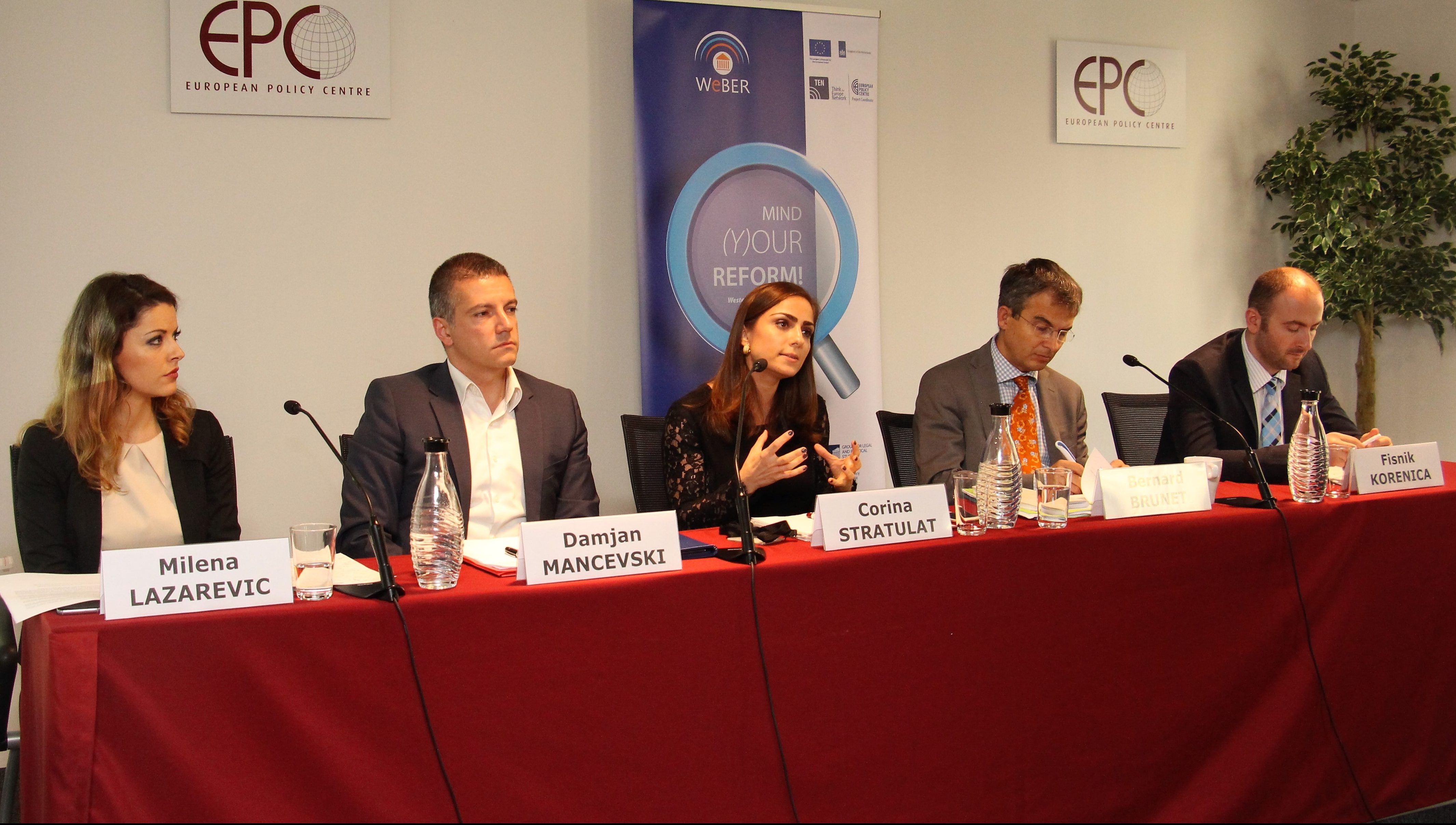WeBER Advocacy Event: PAR and EU enlargement – The Balkan civil society perspective
The panel discussion “Public administration reform and EU enlargement – The Balkan civil society perspective” was held on Tuesday, 3rd October 2017 at European Policy Centre (EPC) in Brussels.
This event, organised as part of the WeBER project, gathered a distinguished panel of experts: Head of Unit at DG NEAR of the European Commission Mr. Bernard Brunet, Macedonian Minister of Information Society and Administration Mr. Damjan Manchevski, CEP Programme Director (and WeBER Project Manager) Milena Lazarevic and Director of the Group for Legal and Political Studies (WeBER partner in Kosovo) Mr. Fisnik Korenica. Corina Stratulat, Senior Policy Analyst from European Policy Centre (EPC) moderated the discussion.
The panel assessed the role of civil society in Public Administration Reform (PAR) in the Balkans, as well as the importance of openness and transparency of the policy dialogue on PAR at all levels. WeBER representatives at the event spoke about the key achievements of the Project, especially with regards to capacity building and cooperation among civil society organisations (CSOs) in the field of PAR across the region.
Highlights of the discussion
Bernard Brunet, Head of Unit Thematic Support, Monitoring and Evaluation (DG NEAR, European Commission), spoke about the importance of inclusive policymaking. He also emphasised the importance of a structured dialogue between external stakeholders and authorities, as well as of consulting CSO before taking decisions. “Consultations with civil society promote EU values, such as openness and inclusiveness”, Brunet highlighted.
The Macedonian Minister of Information Society and Administration Damjan Manchevski spoke about the commitment of the new Macedonian Government to the dialogue with civil society. He stressed: “We need the CSOs to criticise us, but also to follow us into the PAR process.”
He shared Macedonia’s experience in the development of the new PAR strategy and spoke about the recent and ongoing improvements in the openness of the policy process. He explained that fewer draft laws are now sent into the parliamentary deliberation procedure using the urgent proceedings, which limit the discussion and ordinarily result in little or no public consultation. Manchevski spoke of his new concept of government in Macedonia – Gov. 2.0, in which the government opens policy problems to wide discussions and contributions of the society.
In his words, the information technology is of great help in facilitating participation and transparency of the government. “It takes more time, but in the end, we have higher quality policies,” Manchevski said.
Milena Lazarević, CEP Programme Director and WeBER Project Manager, said that to establish themselves as credible interlocutors, CSOs need to rely on evidence and present proposals of substance to the governments.
She also spoke about European Commissions’ role in helping the administrations in the Balkan countries comply with the EU requirements in relation to public participation and civil society inclusion in PAR.
“We need the administrations in the Balkans to learn and to adapt during the pre-accession period, with the help of the Commission,” stated Lazarević, adding that “administrations need to develop transparency and good service delivery, in order to get closer to the citizens.”
Ms. Lazarevic presented the main achievements of the WeBER project related to civil society capacity building in the area of public administration reform. She also spoke about the regional consultative mechanisms established as part of the Project, emphasising that “the WeBER Platform now gathers 22 strong CSOs within the regional level platform, and over 100 local CSOs as members of the National Working Groups on PAR in the 6 Western Balkan countries. It is our task and a challenge to build the capacity of the civil society in this highly complex area,” she added.
She concluded by highlighting the importance of proper information of the wider public, because the entire society needs to understand the value of public administration reform.
Referring further to the WeBER project, Mr. Fisnik Korenica, Director of GLPS from Prishtina, highlighted the importance of WeBER’s work, stating that “united under WeBER, civil society is stronger and has a voice in Brussels. Now DG NEAR knows us and we are better able to keep each other informed in this area,” Korenica concluded.
As part of the discussion, the participants made a number of suggestions and proposals for opening and increasing the transparency of the PAR policy dialogue between the European Commission and the Balkan governments.
In the aftermath of the panel, European Policy Centre (EPC – WeBER partner in Brussels) published a policy brief, co-authored by Milena Lazarevic and Corina Stratulat, making the case for a more forceful and more structured approach towards the involvement of civil society in the work of the PAR Special Groups in all countries aspiring to join the European Union. The policy brief can be accessed here.
Western Balkans Enabling Project for Civil Society Monitoring of Public Administration Reform –WeBER – is a three-year project funded by the European Union and co-funded by the Kingdom of the Netherlands.
For more information, please visit www.par-monitor.org

